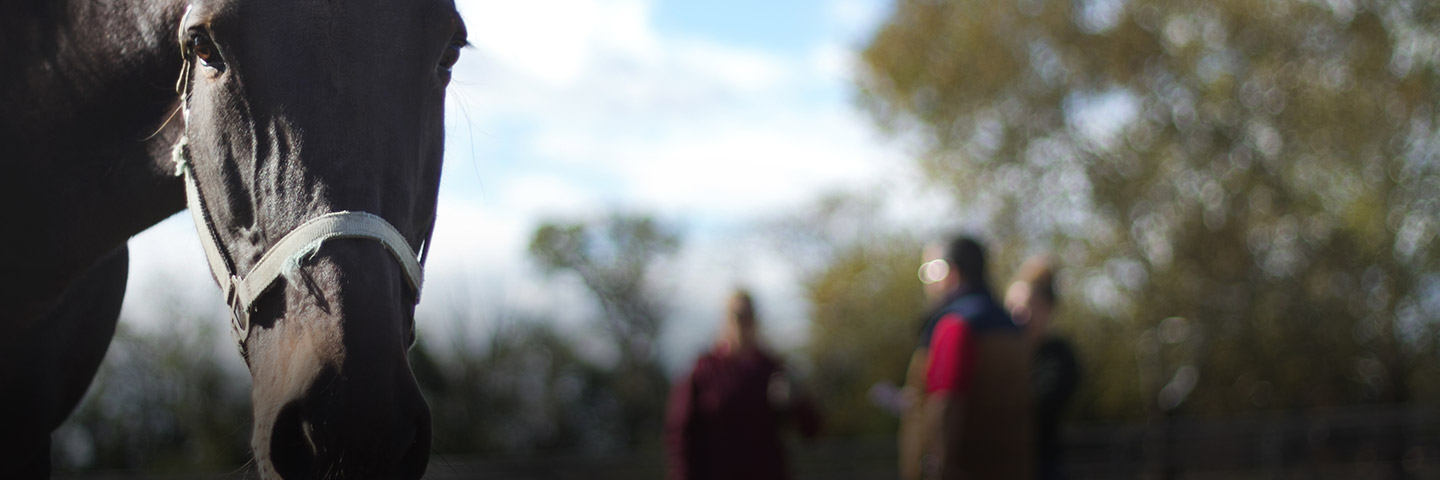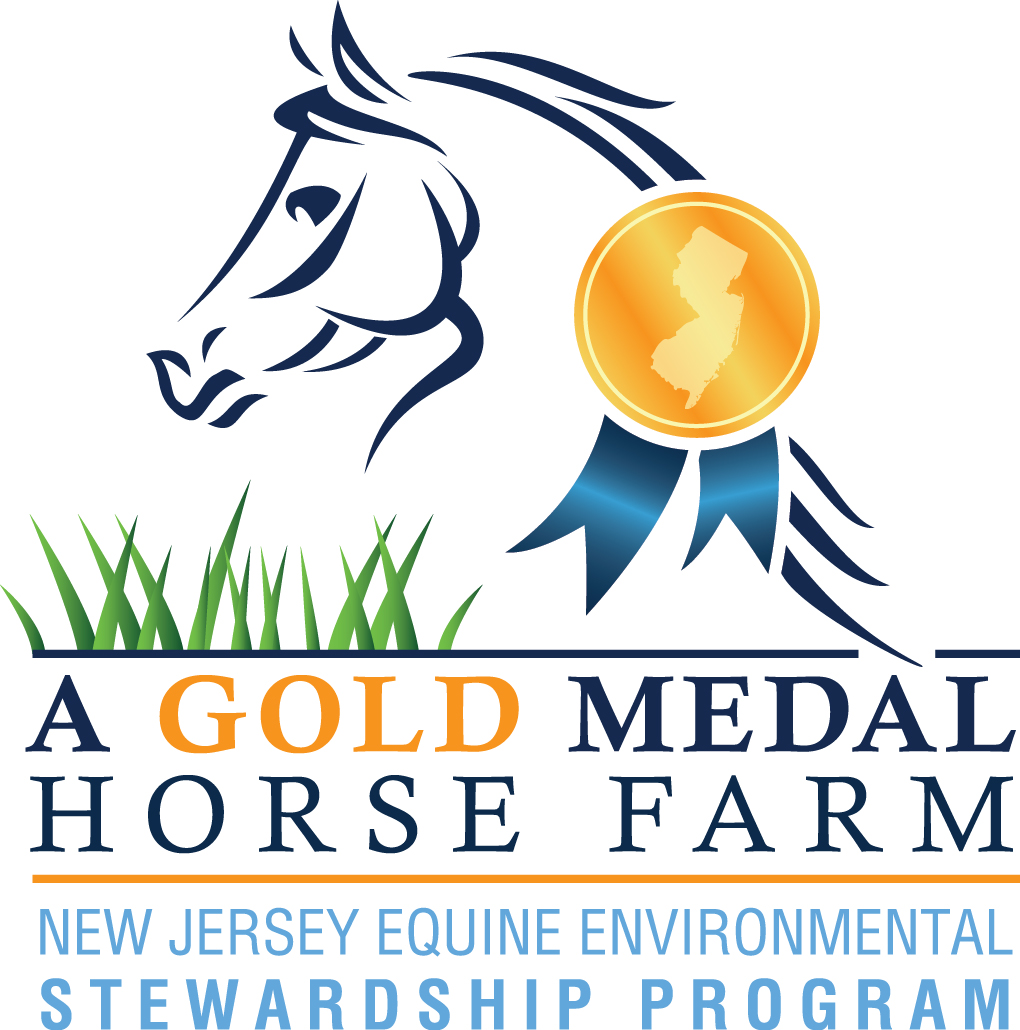New Jersey Gold Medal Horse Farm Program
Environmentally friendly farms give the consumer greater confidence in the environmental sustainability of agriculture and encourages public support for the industry. This award gives recognition to the most outstanding equine farms and their environmental sustainability and management.
Eligibility
All New Jersey horse farm owners are invited to submit an application for the award. Farms receiving the highest scores will receive a Gold Medal Equine Farm plaque to be displayed on their farm.
Awards will be based upon environmental stewardship, general farm appearance, an implemented AWMP or CNMP, and adherence to the following points:
- Controlling animal access to the waters of the State;
- Storing manure at least 100 linear feet from surface waters of the State; “Water or waters of the State means the ocean and its estuaries, all springs, streams, and bodies of surface or ground water, whether natural or artificial, within the boundaries of the State or subject to its jurisdiction.”
- Applying manure using proper nutrient management practices;
- Minimizing odors from manure storage and application areas;
- Optimizing the beneficial use of nutrients from manure and bedding materials;
- Having a biosecurity program in place to minimize disease risk.
In addition, feed management and pasture management will be considered. Attractive background scenery, fencing, buildings, cleanliness, etc., which are important for making a good impression, shall also be weighed in judging. Soil erosion, water quality, stream bank and fencing management will also be considered. These awards, no more than 4-5 annually, will acknowledge outstanding management and be given only to a select few.
This program will select equine farms in New Jersey that have outstanding environmental management. The program will give these farms recognition and will provide some free publicity when awarded at an RCE or NJDA event.
Judging will be based on pre-determined standards; the minimum would be to have an Animal Waste Management Plan or a Comprehensive Nutrient Management Plan. Beyond the points listed above, water quality, soil erosion, stream and water management, pasture management, feed management, manure storage management, sanitation, etc will be evaluated. General farm management and visual appearances of the farm will also be considered.
How is the selection completed?
The selection is completed by a pre-determined ranking process that requires both a producer application and an evaluative process.
Selection process
- Gold Medal Application. Producers need to complete an application that includes general information about their farm (type, horse numbers, acreage, etc.), a copy of their AWMP/CNMP, and a self-assessment of their farm. A $100.00 application fee will be required of all applicants to go towards continuing the program.
- Review. A team of reviewers will walk through the farm and make recommendations about the farm. These recommendations have two uses: first, to evaluate the farm for suitability for the program, second to point out any deficiencies. The review team will be made up of members from RCE, NJDA, NRCS, and any other appropriate groups such as might be represented on the USDA-NRCS Technical Committee.
- General farm observations will be made by a team of individuals to gain a feel for the operation. Then there will be a thorough walkthrough of the farm by the team. Reviewers will use an assessment and a ranking system similar to the one described in RCE publication “FS 1047 New Jersey Livestock Farmer Survey: Is my farm environmentally friendly?
- Reviewers will evaluate AWMP/CNMP plans for completeness, accuracy, and appropriate record-keeping. Soil tests, farm maps, manure spreading and disposal records, descriptions of environmental improvements, both completed and planned, will be reviewed.
- Farms will be assessed for the six points listed at the beginning of this document.
- Water quality, soil erosion, stream and water management, pasture management, feed management, manure storage management, sanitation, etc will also be evaluated.
- The team will evaluate all applications and make a ranking of eligible applicants.
- The award program may be used for subsequent advertising or promotion for environmental stewardship in New Jersey. Horse farmers, who apply to participate in this program, if selected, agree to cooperate with promotional activities and make all reasonable efforts to maintain the level of environmental stewardship on their operations.
HOW THE JUDGING WORKS
- Formal applications can be obtained from the Rutgers University Equine Science Center. Applications will be due August 1. These will be reviewed for completeness prior to judging.
- Judging teams will visit farms during the month of September.
- The judges’ final ranking will be made and results given to the Rutgers University Equine Science Center and the NJDA Division of Agricultural and Natural Resources.
- Results will be announced at the Equine Science Center Update.
- Awards will be given at the New Jersey State Agriculture Convention.
- Any previously awarded farm failing to maintain program standards will have their award revoked.
RULES FOR THE EQUINE ENVIRONMENTAL STEWARDSHIP PROGRAM
- Equine Environmental Stewardship Program signs remain the property of the Rutgers University Equine Science Center.
- The post and bracket for the sign shall be supplied by and maintained by the farmer.
- The sign shall be displayed in front of the farm at roadside. An attractive post and bracket or other frame shall be used to display the sign. No more than three signs should be displayed from the sign frame or post, and all shall be of a style, general size and quality comparable to the Equine Environmental Stewardship Program signs. The sign should be secured on all sides to avoid wind damage.
- Signs shall not be moved to other premises.
- Replacement of damaged signs shall be at the discretion of the committee.
- No producer shall be charged with scoring or sign expenses.
- The judges’ decision will be final.
- Farms awarded an Equine Environmental Stewardship Program sign will be reassessed every three years between October 1 and October 30.
- Farms that do not continue to qualify will return the sign to the Rutgers University Equine Science Center.


